Tanzu Mission Control Self-Managed Installation
Now that I have a TKGM workload cluster prepared for Tanzu Mission Control Self-Managed (TMC-SM) installation, and a LDAP server up & running as a kubernetes workload in the TKGI cluster as well, the next thing to do is to install the TMC-SM package in the TKGM workload cluster.
As of this writing, the latest version of TMC-SM is 1.4.1, which I will use here.
Add the tanzu-standard package repository
This repository is where the tanzu packages will be downloaded from. Since I have an airgapped environment, I need to specify the private Harbor registry URL, which is harbor.deephackmode.io/tkg.
Also, I also need to specify the right Tanzu Standarad Package Repo version, which is v2024.8.21. To know which package repo version to use according to the TKGM version, review the version mapping table from the TKGM docs.
Make sure that the current cluster context is set to the TKGM workload cluster. Run the tanzu package command, with the right parameters, to add the repo. Remember that I’ve been using the aliases t and k for the commands tanzu and kubectl respectively.
k config use-context av-wkld-admin@av-wkld
t package repository add tanzu-standard \
--url harbor.deephackmode.io/tkg/packages/standard/repo:v2024.8.21 \
--namespace tkg-system"
Once added, it should now show up in the list of added repos.
ubuntu@numbat:~$ t package repository list -A
NAMESPACE NAME SOURCE STATUS
tkg-system tanzu-standard (imgpkg) harbor.deephackmode.io/tkg/packages/standard/repo:v2024.8.21 Reconcile succeeded
ubuntu@numbat:~$
Install cert-manager
The cert-manager workload will be installed to manage the certificates used in TMC-SM.
Set some environment variables that will be used for the cert-manager installation.
export PACKAGE_USER_DEFINED_NAME="cert-manager"
export TANZU_PACKAGE_NAME="cert-manager.tanzu.vmware.com"
export TANZU_KUBECONFIG=~/.kube/config
export TANZU_PACKAGE_NAMESPACE="tkg-system"
export TANZU_PACKAGE_VALUES_FILE=cert-manager.tanzu.vmware.com-data-values.yaml
export TANZU_PACKAGE_VERSION=$(tanzu package available list "${TANZU_PACKAGE_NAME}" -n tkg-system -o json | jq .[].version | tail -n 1 | tr -d '"' )
Make sure that the $TANZU_PACKAGE_VERSION has a valid value.
echo $TANZU_PACKAGE_VERSION
Create the data-values YAML file to be used.
cat > cert-manager.tanzu.vmware.com-data-values.yaml <<EOF
---
#! The namespace in which to deploy cert-manager.
namespace: cert-manager
EOF
Install the cert-manager package.
t package install "${PACKAGE_USER_DEFINED_NAME}" \
--package "${TANZU_PACKAGE_NAME}" \
--version "${TANZU_PACKAGE_VERSION}" \
--values-file "${TANZU_PACKAGE_VALUES_FILE}" \
--namespace "${TANZU_PACKAGE_NAMESPACE}" \
--kubeconfig "${TANZU_KUBECONFIG}"
Create the TMC-SM Cluster Issuer
The Cluster Issuer will be the self-signed certificate that will be used in the installation. This will be managed by the cert-manager.
Create the definition YAML of the Cluster Issuer.
cat > tmcsm-cluster-issuer.yaml <<EOF
apiVersion: cert-manager.io/v1
kind: ClusterIssuer
metadata:
name: selfsigned-issuer
spec:
selfSigned: {}
---
apiVersion: cert-manager.io/v1
kind: ClusterIssuer
metadata:
name: tmcsm-issuer
spec:
ca:
secretName: tmcsm-issuer
---
apiVersion: cert-manager.io/v1
kind: Certificate
metadata:
name: tmcsm-issuer
namespace: cert-manager
spec:
isCA: true
commonName: tmcsm
secretName: tmcsm-issuer
issuerRef:
name: selfsigned-issuer
kind: ClusterIssuer
group: cert-manager.io
EOF
Create the cluster-issuer resource.
k apply -f tmcsm-cluster-issuer.yaml
Retrieve the self-signed cert (cluster-issuer) PEM data and save it in a file. This file will contain the CA’s that we want the cluster nodes to trust. These CA certs will be added to the TMC-SM data values YAML file that will be created in an upcoming step.
k get secret -n cert-manager tmcsm-issuer \
-o=jsonpath="{.data.ca\.crt}" \
| base64 -d > $HOME/trusted-ca.pem
Also need to include the issuer of the Private Harbor server cert. In this case, that cert has been added in /usr/local/share/ca-certificates/opsman-ca.crt earlier.
cat /usr/local/share/ca-certificates/opsman-ca.crt >> ~/trusted-ca.pem
Check the contents of trusted-ca.pem file, and make sure it has two certs (one is the cluster-issuer and the other is the CA for the private registry).
Create the TMC-SM data values YAML file
This template worked for me.
cat > $HOME/tmcsm-values.yaml <<EOF
clusterIssuer: "tmcsm-issuer"
contourEnvoy:
serviceType: "LoadBalancer"
dnsZone: "tmc.deephackmode.io"
harborProject: "harbor.deephackmode.io/tmc-sm-automation"
minio:
password: "Admin!23"
username: "root"
authenticationType: ldap
oidc:
issuerType: "pinniped"
issuerURL: "https://pinniped-supervisor.tmc.deephackmode.io/provider/pinniped"
idpGroupRoles:
admin: tmc-admins
member: tmc-members
ldap:
type: "ldap"
host: "ldap.deephackmode.io"
username: "cn=admin,dc=deephackmode,dc=io"
password: "admin"
domainName: "in-cluster-openldap"
userBaseDN: "ou=users,dc=deephackmode,dc=io"
userSearchFilter: "(&(objectClass=simpleSecurityObject)(cn={}))"
userSearchAttributeUsername: cn
groupBaseDN: "ou=groups,dc=deephackmode,dc=io"
groupSearchFilter: "(&(objectClass=groupOfNames)(member={}))"
rootCA: |
-----BEGIN CERTIFICATE-----
xxx
-----END CERTIFICATE-----
postgres:
userPassword: "Admin!23"
maxConnections: 300
telemetry:
ceipAgreement: false
ceipOptIn: false
eanNumber: ""
trustedCAs:
trusted-ca.pem: |-
-----BEGIN CERTIFICATE-----
xxx
-----END CERTIFICATE-----
EOF
Make sure that the certificates are updated. The .ldap.rootCA should have the PEM data from the ldap.deephackmode.io.crt file. The trustedCAs.trusted-ca.pem should have the contents for $HOME/trusted-ca.pem. See the following step on how to use yq cli to easily set the certificates in the YAML file.
Use yq to add or update values in the YAML a lot easier
You can install yq as below:
yq_url="https://github.com/mikefarah/yq/releases/download/v4.6.1/yq_linux_amd64"
wget -nv ${yq_url}
sudo install yq_linux_amd64 /usr/local/bin/yq
Then, use yq to replace the value of .trustedCAs.trusted-ca.pem in the tmcsm-values.yaml file with the contents of $HOME/trusted-ca.pem.
TRUSTED_CERT="$(cat ./trusted-ca.pem)" yq e '.trustedCAs."trusted-ca.pem" = strenv(TRUSTED_CERT) | .trustedCAs."trusted-ca.pem" style="literal"' -i ./tmcsm-values.yaml
Do the same to replace the value of .ldap.rootCA.
LDAP_CERT="$(cat ./ldap.deephackmode.io.crt)" yq e '.ldap.rootCA = strenv(LDAP_CERT) | .ldap.rootCA style="literal"' -i ./tmcsm-values.yaml
Check the contents of tmcsm-values.yaml and it should now have the certificates set in the right places.
cat tmcsm-values.yaml
Download the tmc-sm bundle from the Broadcom Support Portal.
Go to the Broadcom Support Portal, and download the v1.4.1 of the TMC-SM Bundle.
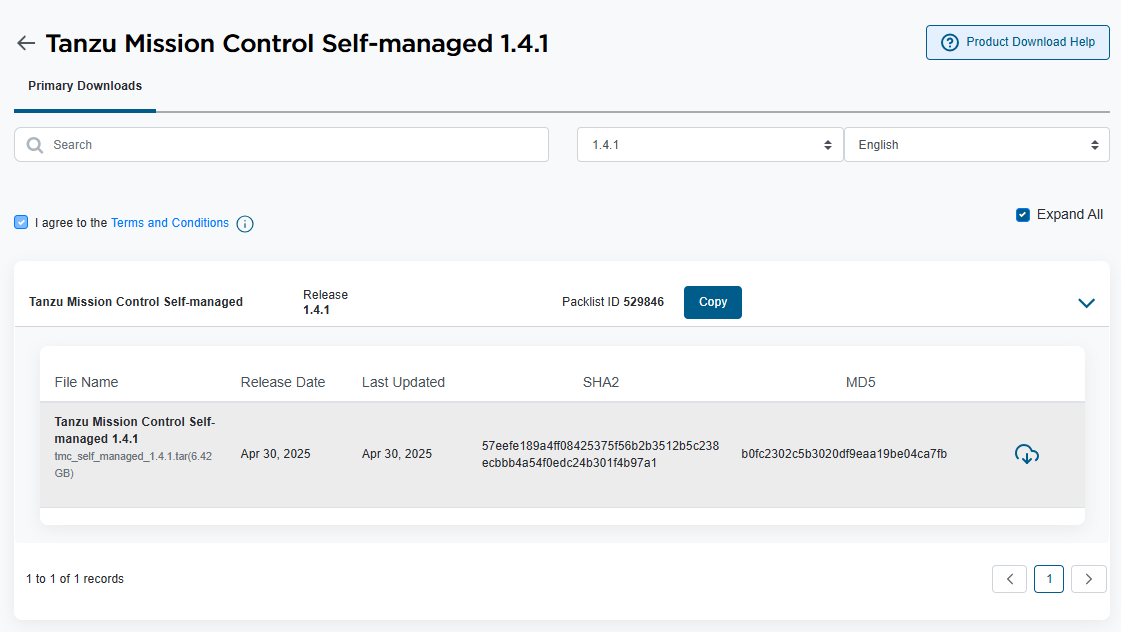
Create a tanzumc directory and untar the contents of the downloaded file there.
ubuntu@numbat:/mnt/tmp/ubuntu$ ls -l
total 6729684
-rw-r--r-- 1 ubuntu ubuntu 6891190784 Jun 7 22:32 tmc_self_managed_1.4.1.tar
ubuntu@numbat:/mnt/tmp/ubuntu$ mkdir tanzumc
ubuntu@numbat:/mnt/tmp/ubuntu$ ls -l
total 6729688
drwxrwxr-x 6 ubuntu ubuntu 4096 Jun 8 03:17 tanzumc
-rw-r--r-- 1 ubuntu ubuntu 6891190784 Jun 7 22:32 tmc_self_managed_1.4.1.tar
ubuntu@numbat:/mnt/tmp/ubuntu$ tar -xf ./tmc_self_managed_1.4.1.tar -C ./tanzumc
ubuntu@numbat:/mnt/tmp/ubuntu$
Push the TMC-SM images to the private registry
In the Harbor private registry, create a new project named “tmc-sm-automation”. This is where the TMC-SM images will be pushed and stored.
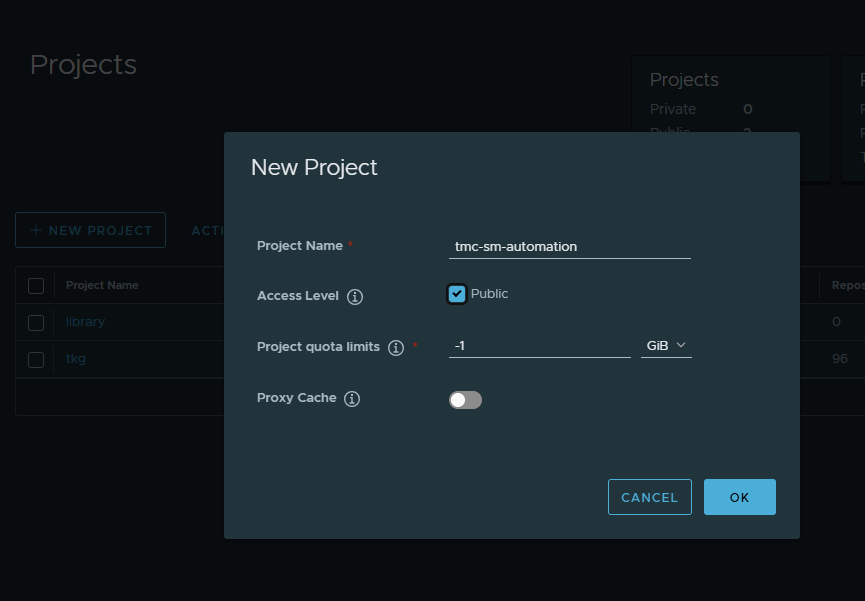
In the jumpbox, login to the private registry.
docker login harbor.deephackmode.io
Change directory to the parent directory of the tanzumc directory that was created earlier.
cd /mnt/tmp/ubuntu
ubuntu@numbat:/mnt/tmp/ubuntu$ ls -l
total 6729688
drwxrwxr-x 6 ubuntu ubuntu 4096 Jun 8 03:17 tanzumc
-rw-r--r-- 1 ubuntu ubuntu 6891190784 Jun 7 22:32 tmc_self_managed_1.4.1.tar
ubuntu@numbat:/mnt/tmp/ubuntu$
Push the TMC-SM images to the registry.
tanzumc/tmc-sm push-images harbor \
--project harbor.deephackmode.io/tmc-sm-automation \
--username admin \
--password 'pa$$w0rd'
After it completes, the below output could be seen.
...
Image Staging Complete. Next Steps:
Setup Kubeconfig (if not already done) to point to cluster:
export KUBECONFIG={YOUR_KUBECONFIG}
Create 'tmc-local' namespace: kubectl create namespace tmc-local
Download Tanzu CLI from Customer Connect (If not already installed)
Update TMC Self Managed Package Repository:
Run: tanzu package repository add tanzu-mission-control-packages --url "harbor.deephackmode.io/tmc-sm-automation/package-repository:1.4.1" --namespace tmc-local
Create a values based on the TMC Self Managed Package Schema:
View the Values Schema: tanzu package available get "tmc.tanzu.vmware.com/1.4.1" --namespace tmc-local --values-schema
Create a Values file named values.yaml matching the schema
Install the TMC Self Managed Package:
Run: tanzu package install tanzu-mission-control -p tmc.tanzu.vmware.com --version "1.4.1" --values-file values.yaml --namespace tmc-local
Create the tmc-local namespace
Let’s create the namespace where the tmc-sm workload app will live.
k create ns tmc-local
Add the TMC-SM package repo
Run the command to add the TMC-SM package repo to the cluster.
t package repository add tanzu-mission-control-packages \
--url "harbor.deephackmode.io/tmc-sm-automation/package-repository:1.4.1"\
--namespace tmc-local
Install the TMC-SM Package
Run the command to install the TMC-SM v1.4.1 package.
t package install tanzu-mission-control \
-p tmc.tanzu.vmware.com \
--version "1.4.1" \
--values-file tmcsm-values.yaml \
--namespace tmc-local
Verify if the installation was successful
Check if the packages are all reconciled successfully.
ubuntu@numbat:~$ t package installed list -A
NAMESPACE NAME PACKAGE-NAME PACKAGE-VERSION STATUS
tkg-system av-wkld-antrea antrea.tanzu.vmware.com 1.13.3+vmware.4-tkg.1 Reconcile succeeded
tkg-system av-wkld-capabilities capabilities.tanzu.vmware.com 0.32.3+vmware.1 Reconcile succeeded
tkg-system av-wkld-gateway-api gateway-api.tanzu.vmware.com 1.0.0+vmware.1-tkg.2 Reconcile succeeded
tkg-system av-wkld-load-balancer-and-ingress-service load-balancer-and-ingress-service.tanzu.vmware.com 1.12.2+vmware.1-tkg.1 Reconcile succeeded
tkg-system av-wkld-metrics-server metrics-server.tanzu.vmware.com 0.6.2+vmware.8-tkg.1 Reconcile succeeded
tkg-system av-wkld-pinniped pinniped.tanzu.vmware.com 0.25.0+vmware.3-tkg.1 Reconcile succeeded
tkg-system av-wkld-secretgen-controller secretgen-controller.tanzu.vmware.com 0.15.0+vmware.2-tkg.1 Reconcile succeeded
tkg-system av-wkld-tkg-storageclass tkg-storageclass.tanzu.vmware.com 0.32.3+vmware.1 Reconcile succeeded
tkg-system av-wkld-vsphere-cpi vsphere-cpi.tanzu.vmware.com 1.28.0+vmware.3-tkg.2 Reconcile succeeded
tkg-system av-wkld-vsphere-csi vsphere-csi.tanzu.vmware.com 3.3.0+vmware.1-tkg.1 Reconcile succeeded
tkg-system cert-manager cert-manager.tanzu.vmware.com 1.7.2+vmware.3-tkg.3 Reconcile succeeded
tmc-local contour contour.bitnami.com 18.2.19 Reconcile succeeded
tmc-local kafka kafka.bitnami.com 28.3.2 Reconcile succeeded
tmc-local kafka-topic-controller kafka-topic-controller.tmc.tanzu.vmware.com 0.0.33 Reconcile succeeded
tmc-local minio minio.bitnami.com 14.6.8 Reconcile succeeded
tmc-local pinniped pinniped.bitnami.com 2.3.1 Reconcile succeeded
tmc-local postgres tmc-local-postgres.tmc.tanzu.vmware.com 0.0.138 Reconcile succeeded
tmc-local postgres-endpoint-controller postgres-endpoint-controller.tmc.tanzu.vmware.com 0.1.72 Reconcile succeeded
tmc-local redis redis.bitnami.com 19.5.15 Reconcile succeeded
tmc-local reloader-reloader reloader-reloader.tmc.tanzu.vmware.com 1.0.107 Reconcile succeeded
tmc-local s3-access-operator s3-access-operator.tmc.tanzu.vmware.com 0.1.36 Reconcile succeeded
tmc-local tanzu-mission-control tmc.tanzu.vmware.com 1.4.1 Reconcile succeeded
tmc-local tmc-local-monitoring monitoring.tmc.tanzu.vmware.com 0.0.22 Reconcile succeeded
tmc-local tmc-local-stack tmc-local-stack.tmc.tanzu.vmware.com 0.1.1865088 Reconcile succeeded
tmc-local tmc-local-stack-secrets tmc-local-stack-secrets.tmc.tanzu.vmware.com 0.1.1865088 Reconcile succeeded
tmc-local tmc-local-support tmc-local-support.tmc.tanzu.vmware.com 0.1.1865088 Reconcile succeeded
ubuntu@numbat:~$
Check if all the pods are running fine or completed successfully.
ubuntu@numbat:~$ k -n tmc-local get po
NAME READY STATUS RESTARTS AGE
account-manager-server-dc57b5544-f8vpm 1/1 Running 0 18h
account-manager-server-dc57b5544-k8nxz 1/1 Running 0 18h
agent-gateway-server-76d6456674-2bkvn 1/1 Running 0 18h
agent-gateway-server-76d6456674-j5jlq 1/1 Running 0 18h
alertmanager-tmc-local-monitoring-tmc-local-0 2/2 Running 0 18h
api-gateway-server-75f6cd4cd6-sc5mc 1/1 Running 0 18h
api-gateway-server-75f6cd4cd6-xxfwb 1/1 Running 0 18h
audit-service-consumer-77d7d6f4db-95qr2 1/1 Running 0 18h
audit-service-consumer-77d7d6f4db-q9fmd 1/1 Running 0 18h
audit-service-server-68c9fbcfd-6ccml 1/1 Running 0 18h
audit-service-server-68c9fbcfd-w6dzn 1/1 Running 0 18h
auth-manager-server-746486c99-27xzp 1/1 Running 0 18h
auth-manager-server-746486c99-pnjvr 1/1 Running 0 18h
authentication-server-7dc45c8f4-k6jnx 1/1 Running 0 18h
authentication-server-7dc45c8f4-pmmr4 1/1 Running 0 18h
cluster-agent-service-server-5c744cd5d5-j8kgx 1/1 Running 0 18h
cluster-agent-service-server-5c744cd5d5-k9522 1/1 Running 0 18h
cluster-config-server-6bfbf674d6-rncxg 1/1 Running 0 18h
cluster-config-server-6bfbf674d6-tzqtf 1/1 Running 0 18h
cluster-object-service-server-6d489f8d8-rx7zh 1/1 Running 0 18h
cluster-object-service-server-6d489f8d8-s5gkg 1/1 Running 0 18h
cluster-reaper-server-57488ddfc6-8jjjp 1/1 Running 0 18h
cluster-secret-server-698d4cdb5f-rv6dv 1/1 Running 0 18h
cluster-secret-server-698d4cdb5f-s52dv 1/1 Running 0 18h
cluster-service-server-74dc699659-4wkrg 1/1 Running 0 18h
cluster-service-server-74dc699659-wm7k7 1/1 Running 0 18h
cluster-sync-egest-6ff58c7b7b-bvk47 1/1 Running 0 18h
cluster-sync-egest-6ff58c7b7b-fnlwz 1/1 Running 0 18h
cluster-sync-ingest-7c7f57d854-2kpd6 1/1 Running 0 18h
cluster-sync-ingest-7c7f57d854-fgqpc 1/1 Running 0 18h
contour-contour-779554fd5d-x2z8f 1/1 Running 0 18h
contour-contour-certgen-qljhj 0/1 Completed 0 18h
contour-envoy-5k9d7 2/2 Running 0 18h
contour-envoy-tznrz 2/2 Running 0 18h
contour-envoy-zkm49 2/2 Running 0 18h
dataprotection-server-545d85567f-7vrl7 1/1 Running 0 18h
dataprotection-server-545d85567f-g66hq 1/1 Running 0 18h
events-service-consumer-745c4f96b-9kj5h 1/1 Running 0 18h
events-service-consumer-745c4f96b-gfltt 1/1 Running 0 18h
events-service-server-68c69f8677-fdtxg 1/1 Running 0 18h
events-service-server-68c69f8677-sxpz2 1/1 Running 0 18h
fanout-service-server-b9c478955-pgm6d 1/1 Running 0 18h
fanout-service-server-b9c478955-vnvwk 1/1 Running 0 18h
feature-flag-service-server-7764b6dd9d-tw6pr 1/1 Running 0 18h
helm-deployment-server-679b89bdd6-hkg55 1/1 Running 0 18h
helm-deployment-server-679b89bdd6-pl7qt 1/1 Running 0 18h
inspection-server-5cf8678bb-b7544 2/2 Running 0 18h
inspection-server-5cf8678bb-crvpl 2/2 Running 0 18h
intent-server-6cf59cb6d7-phnb2 1/1 Running 0 18h
intent-server-6cf59cb6d7-pqlz7 1/1 Running 0 18h
kafka-controller-0 1/1 Running 0 18h
kafka-exporter-5f6f84d484-4qfmz 1/1 Running 0 18h
kafka-topic-controller-7c499956f5-pplv2 1/1 Running 0 18h
kafka-zookeeper-0 1/1 Running 0 18h
landing-service-server-6d88bcfdc8-9h4cr 1/1 Running 0 18h
minio-7554bbdc98-6rn97 1/1 Running 1 (18h ago) 18h
minio-provisioning-prv5l 0/1 Completed 0 18h
onboarding-service-server-7f774d6dd7-twhnk 1/1 Running 0 18h
onboarding-service-server-7f774d6dd7-zhhkv 1/1 Running 0 18h
package-deployment-server-9f5848c84-cxv4n 1/1 Running 0 18h
package-deployment-server-9f5848c84-rfn55 1/1 Running 0 18h
pinniped-supervisor-684cdd9d77-9tb5v 1/1 Running 0 18h
policy-engine-server-6494bdf78-54znw 1/1 Running 0 18h
policy-engine-server-6494bdf78-5rc9v 1/1 Running 0 18h
policy-insights-server-6d749bf9bc-5xgd6 1/1 Running 0 18h
policy-insights-server-6d749bf9bc-8rxzd 1/1 Running 0 18h
policy-sync-service-server-85b44b8fd5-m56np 1/1 Running 0 18h
policy-view-service-server-78959-pkx92 1/1 Running 0 18h
policy-view-service-server-78959-r57xp 1/1 Running 0 18h
postgres-endpoint-controller-6778b889fc-rwksm 1/1 Running 0 18h
postgres-postgresql-0 2/2 Running 0 18h
prometheus-server-tmc-local-monitoring-tmc-local-0 2/2 Running 0 18h
provisioner-service-server-8457795bd-glbzk 1/1 Running 0 18h
provisioner-service-server-8457795bd-k6ddw 1/1 Running 0 18h
rate-limit-service-server-78676cb956-m58gd 3/3 Running 0 18h
rate-limit-service-server-78676cb956-xp9pd 3/3 Running 0 18h
redis-master-0 1/1 Running 0 18h
reloader-reloader-674f8bb9f-rvhxp 1/1 Running 0 18h
resource-manager-server-7bfcfbbf6b-56r4n 1/1 Running 0 18h
resource-manager-server-7bfcfbbf6b-w6n6m 1/1 Running 0 18h
s3-access-operator-845c575b8f-d5hbz 1/1 Running 0 18h
settings-service-server-bb548f955-6fx2r 1/1 Running 0 18h
settings-service-server-bb548f955-fkl95 1/1 Running 0 18h
telemetry-event-service-consumer-f68fdc459-4hvr9 1/1 Running 0 18h
telemetry-event-service-consumer-f68fdc459-zjblm 1/1 Running 0 18h
tenancy-service-server-7c8487d976-l2hkq 1/1 Running 0 18h
ui-server-698d774d88-8kdbq 1/1 Running 0 18h
ui-server-698d774d88-rdlj9 1/1 Running 0 18h
wcm-server-84b7dd6f46-8267j 1/1 Running 0 18h
wcm-server-84b7dd6f46-zmmml 1/1 Running 0 18h
ubuntu@numbat:~$
Check the services. One of them is the contour-envoy LoadBalancer and should have an ExternalIP.
ubuntu@numbat:~$ k get svc -n tmc-local
NAME TYPE CLUSTER-IP EXTERNAL-IP PORT(S) AGE
account-manager-grpc ClusterIP 100.64.146.56 <none> 443/TCP 18h
account-manager-service ClusterIP 100.65.120.244 <none> 443/TCP,7777/TCP 18h
agent-gateway-service ClusterIP 100.66.241.163 <none> 443/TCP,8443/TCP,7777/TCP 18h
alertmanager-tmc-local-monitoring-tmc-local ClusterIP 100.66.81.77 <none> 9093/TCP 18h
api-gateway-service ClusterIP 100.69.62.101 <none> 443/TCP,8443/TCP,7777/TCP 18h
audit-service-consumer ClusterIP 100.65.93.247 <none> 7777/TCP 18h
audit-service-grpc ClusterIP 100.66.188.128 <none> 443/TCP 18h
audit-service-rest ClusterIP 100.69.215.235 <none> 443/TCP 18h
audit-service-service ClusterIP 100.68.91.3 <none> 443/TCP,8443/TCP,7777/TCP 18h
auth-manager-server ClusterIP 100.67.60.71 <none> 443/TCP 18h
auth-manager-service ClusterIP 100.65.73.199 <none> 443/TCP,7777/TCP 18h
authentication-grpc ClusterIP 100.69.189.3 <none> 443/TCP 18h
authentication-service ClusterIP 100.71.0.141 <none> 443/TCP,7777/TCP 18h
cluster-agent-service-grpc ClusterIP 100.67.173.245 <none> 443/TCP 18h
cluster-agent-service-installer ClusterIP 100.69.38.17 <none> 80/TCP 18h
cluster-agent-service-service ClusterIP 100.65.29.169 <none> 443/TCP,80/TCP,7777/TCP 18h
cluster-config-service ClusterIP 100.70.224.60 <none> 443/TCP,7777/TCP 18h
cluster-object-service-grpc ClusterIP 100.67.48.198 <none> 443/TCP 18h
cluster-object-service-service ClusterIP 100.70.3.105 <none> 443/TCP,8443/TCP,7777/TCP 18h
cluster-reaper-grpc ClusterIP 100.68.164.19 <none> 443/TCP 18h
cluster-reaper-service ClusterIP 100.71.199.18 <none> 443/TCP,7777/TCP 18h
cluster-secret-service ClusterIP 100.69.127.223 <none> 443/TCP,7777/TCP 18h
cluster-service-grpc ClusterIP 100.71.29.227 <none> 443/TCP 18h
cluster-service-rest ClusterIP 100.71.32.41 <none> 443/TCP 18h
cluster-service-service ClusterIP 100.65.61.10 <none> 443/TCP,8443/TCP,7777/TCP 18h
cluster-sync-egest ClusterIP 100.66.126.38 <none> 443/TCP,7777/TCP 18h
cluster-sync-egest-grpc ClusterIP 100.64.137.229 <none> 443/TCP 18h
cluster-sync-ingest ClusterIP 100.64.76.250 <none> 443/TCP,7777/TCP 18h
cluster-sync-ingest-grpc ClusterIP 100.70.160.14 <none> 443/TCP 18h
contour ClusterIP 100.67.120.162 <none> 8001/TCP 18h
contour-envoy LoadBalancer 100.71.214.251 192.168.86.201 80:32218/TCP,443:32526/TCP 18h
contour-envoy-metrics ClusterIP None <none> 8002/TCP 18h
dataprotection-grpc ClusterIP 100.69.4.237 <none> 443/TCP 18h
dataprotection-service ClusterIP 100.71.90.191 <none> 443/TCP,8443/TCP,7777/TCP 18h
events-service-consumer ClusterIP 100.65.141.139 <none> 7777/TCP 18h
events-service-grpc ClusterIP 100.68.193.33 <none> 443/TCP 18h
events-service-service ClusterIP 100.65.10.31 <none> 443/TCP,7777/TCP 18h
fanout-service-grpc ClusterIP 100.68.221.61 <none> 443/TCP 18h
fanout-service-service ClusterIP 100.65.126.220 <none> 443/TCP,7777/TCP 18h
feature-flag-service-grpc ClusterIP 100.71.137.124 <none> 443/TCP 18h
feature-flag-service-service ClusterIP 100.64.254.99 <none> 443/TCP,7777/TCP 18h
helm-deployment-service ClusterIP 100.68.160.40 <none> 443/TCP,7777/TCP 18h
inspection-grpc ClusterIP 100.70.131.111 <none> 443/TCP 18h
inspection-service ClusterIP 100.67.16.181 <none> 443/TCP,7777/TCP 18h
intent-grpc ClusterIP 100.66.107.198 <none> 443/TCP 18h
intent-service ClusterIP 100.68.64.189 <none> 443/TCP,7777/TCP 18h
kafka ClusterIP 100.69.51.174 <none> 9092/TCP 18h
kafka-controller-headless ClusterIP None <none> 9094/TCP,9092/TCP,9093/TCP 18h
kafka-metrics ClusterIP 100.65.71.22 <none> 9308/TCP 18h
kafka-zookeeper ClusterIP 100.68.77.20 <none> 2181/TCP 18h
kafka-zookeeper-headless ClusterIP None <none> 2181/TCP,2888/TCP,3888/TCP 18h
landing-service-metrics ClusterIP None <none> 7777/TCP 18h
landing-service-rest ClusterIP 100.65.191.234 <none> 443/TCP 18h
landing-service-server ClusterIP 100.71.145.239 <none> 443/TCP 18h
minio ClusterIP 100.69.82.179 <none> 9000/TCP,9001/TCP 18h
onboarding-service-metrics ClusterIP None <none> 7777/TCP 18h
onboarding-service-rest ClusterIP 100.71.152.81 <none> 443/TCP 18h
package-deployment-eula-server ClusterIP 100.64.187.205 <none> 80/TCP 18h
package-deployment-service ClusterIP 100.69.236.96 <none> 443/TCP,80/TCP,7777/TCP 18h
pinniped-supervisor ClusterIP 100.69.214.139 <none> 443/TCP 18h
pinniped-supervisor-api ClusterIP 100.65.210.114 <none> 443/TCP 18h
policy-engine-grpc ClusterIP 100.66.250.27 <none> 443/TCP 18h
policy-engine-service ClusterIP 100.71.196.235 <none> 443/TCP,7777/TCP 18h
policy-insights-grpc ClusterIP 100.69.80.157 <none> 443/TCP 18h
policy-insights-service ClusterIP 100.70.219.250 <none> 443/TCP,7777/TCP 18h
policy-sync-service-service ClusterIP 100.67.223.9 <none> 7777/TCP 18h
policy-view-service-grpc ClusterIP 100.66.47.232 <none> 443/TCP 18h
policy-view-service-service ClusterIP 100.71.130.126 <none> 443/TCP,7777/TCP 18h
postgres-endpoint-controller ClusterIP 100.64.140.129 <none> 9876/TCP 18h
postgres-postgresql ClusterIP 100.71.134.220 <none> 5432/TCP 18h
postgres-postgresql-hl ClusterIP None <none> 5432/TCP 18h
postgres-postgresql-metrics ClusterIP 100.70.73.186 <none> 9187/TCP 18h
prometheus-server-tmc-local-monitoring-tmc-local ClusterIP 100.64.10.31 <none> 9090/TCP 18h
provisioner-service-grpc ClusterIP 100.69.59.4 <none> 443/TCP 18h
provisioner-service-service ClusterIP 100.65.101.205 <none> 443/TCP,7777/TCP 18h
rate-limit-service-server ClusterIP 100.69.104.129 <none> 80/TCP,443/TCP,7777/TCP 18h
redis-headless ClusterIP None <none> 6379/TCP 18h
redis-master ClusterIP 100.67.129.75 <none> 6379/TCP 18h
resource-manager-grpc ClusterIP 100.66.45.99 <none> 443/TCP 18h
resource-manager-service ClusterIP 100.65.114.43 <none> 443/TCP,8443/TCP,7777/TCP 18h
s3-access-operator ClusterIP 100.64.161.115 <none> 443/TCP,8080/TCP 18h
settings-service-server ClusterIP 100.67.94.123 <none> 443/TCP,7777/TCP 18h
telemetry-event-service-consumer ClusterIP 100.64.194.201 <none> 7777/TCP 18h
tenancy-service-metrics-headless ClusterIP None <none> 7777/TCP 18h
tenancy-service-tenancy-service ClusterIP 100.68.203.68 <none> 443/TCP 18h
tenancy-service-tenancy-service-rest ClusterIP 100.70.26.183 <none> 443/TCP 18h
ui-server ClusterIP 100.66.124.148 <none> 8443/TCP,7777/TCP 18h
wcm-grpc ClusterIP 100.69.212.118 <none> 443/TCP 18h
wcm-service ClusterIP 100.69.215.241 <none> 443/TCP,8443/TCP,7777/TCP 18h
ubuntu@numbat:~$
Add the DNS entries for TMC-SM components
Note the service named contour-envoy and its ExternalIP.
NAME TYPE CLUSTER-IP EXTERNAL-IP PORT(S)
contour-envoy LoadBalancer 100.71.214.251 192.168.86.201 80:32218/TCP,443:32526/TCP
In my case, I’m using dnsmasq and so I added the following A records pointing to the controu-envoy service’s LoadBalancer ExternalIP.
host-record=tmc.deephackmode.io,192.168.86.201
host-record=alertmanager.tmc.deephackmode.io,192.168.86.201
host-record=auth.tmc.deephackmode.io,192.168.86.201
host-record=blob.tmc.deephackmode.io,192.168.86.201
host-record=console.s3.tmc.deephackmode.io,192.168.86.201
host-record=gts-rest.tmc.deephackmode.io,192.168.86.201
host-record=gts.tmc.deephackmode.io,192.168.86.201
host-record=landing.tmc.deephackmode.io,192.168.86.201
host-record=pinniped-supervisor.tmc.deephackmode.io,192.168.86.201
host-record=prometheus.tmc.deephackmode.io,192.168.86.201
host-record=s3.tmc.deephackmode.io,192.168.86.201
host-record=tmc-local.s3.tmc.deephackmode.io,192.168.86.201
The need to add these A records are documented in the TMC documentation on “Configure a DNS zone”.
Reload the DNS configuration, and make sure that the TMC host names are resolving to the IP address accordingly.
Log in to the TMC-SM UI
Go to https://tmc.deephackmode.io. You should be greeted by this “Sign In” page.
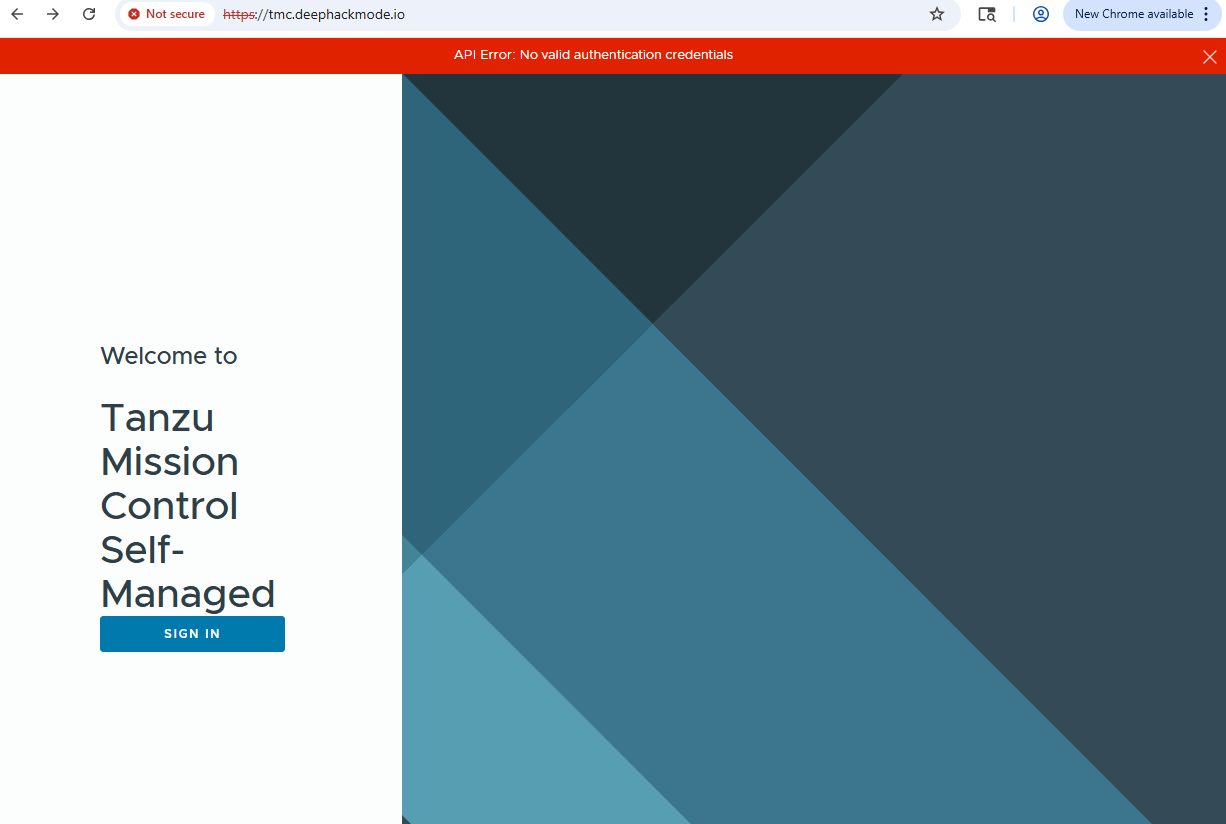
Click the “Sign In” button, and then you should be redirected to the “Pinniped Login” page.
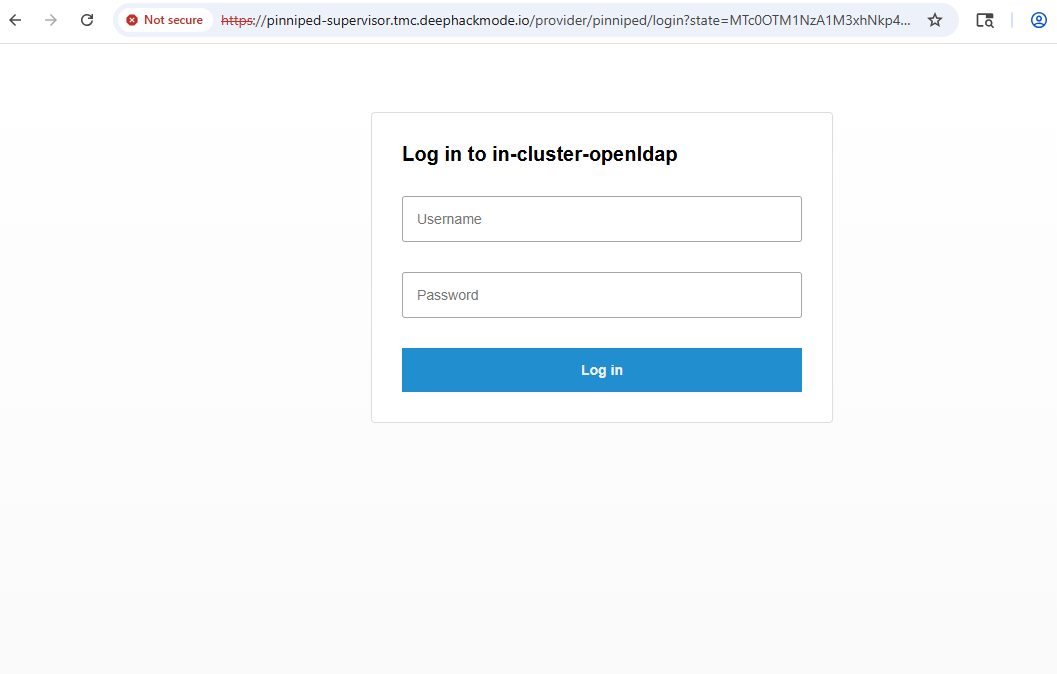
Log in with your LDAP Username and Password. Review the post Deploy a LDAP server workload, to know what username and password that can be used.
Once logged in, you should see this screen.
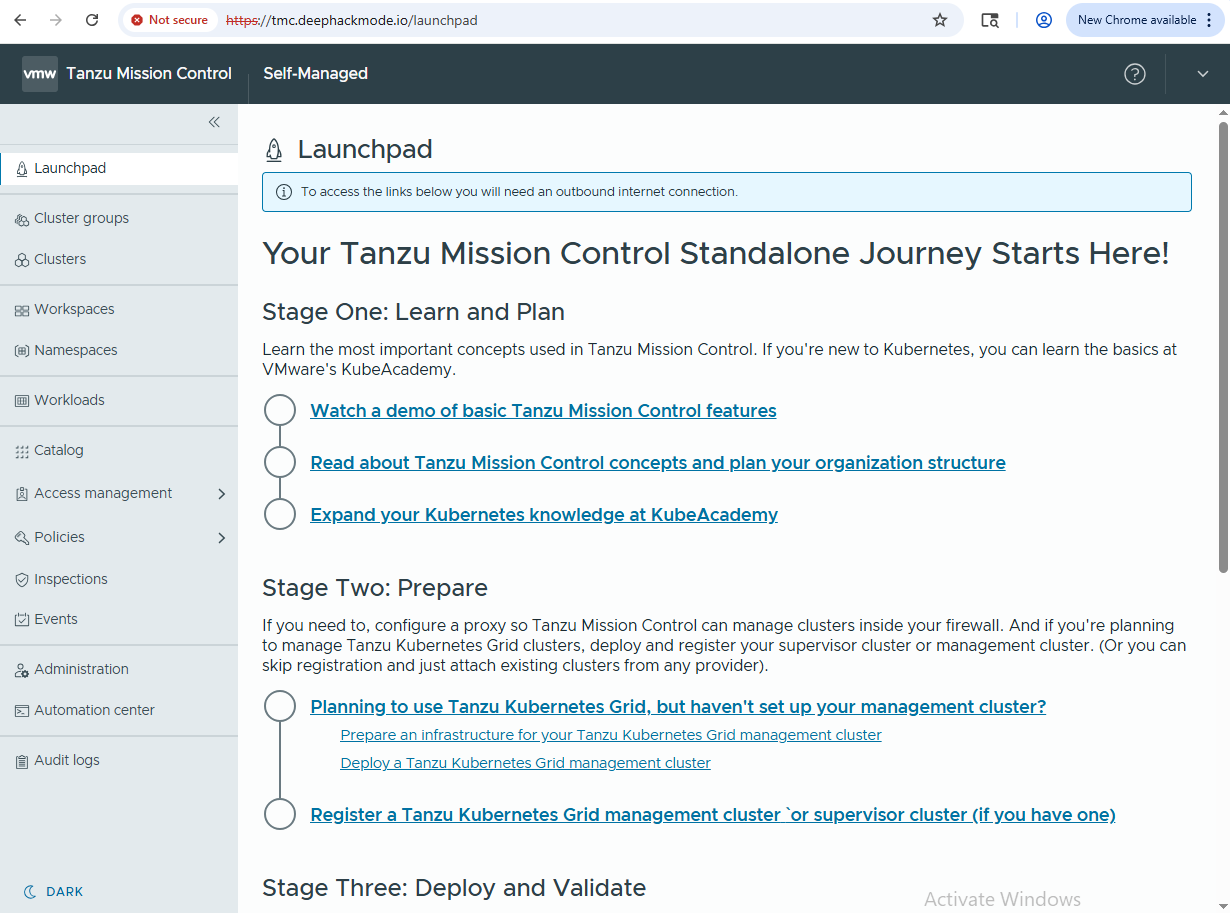
You could switch to Dark Mode.
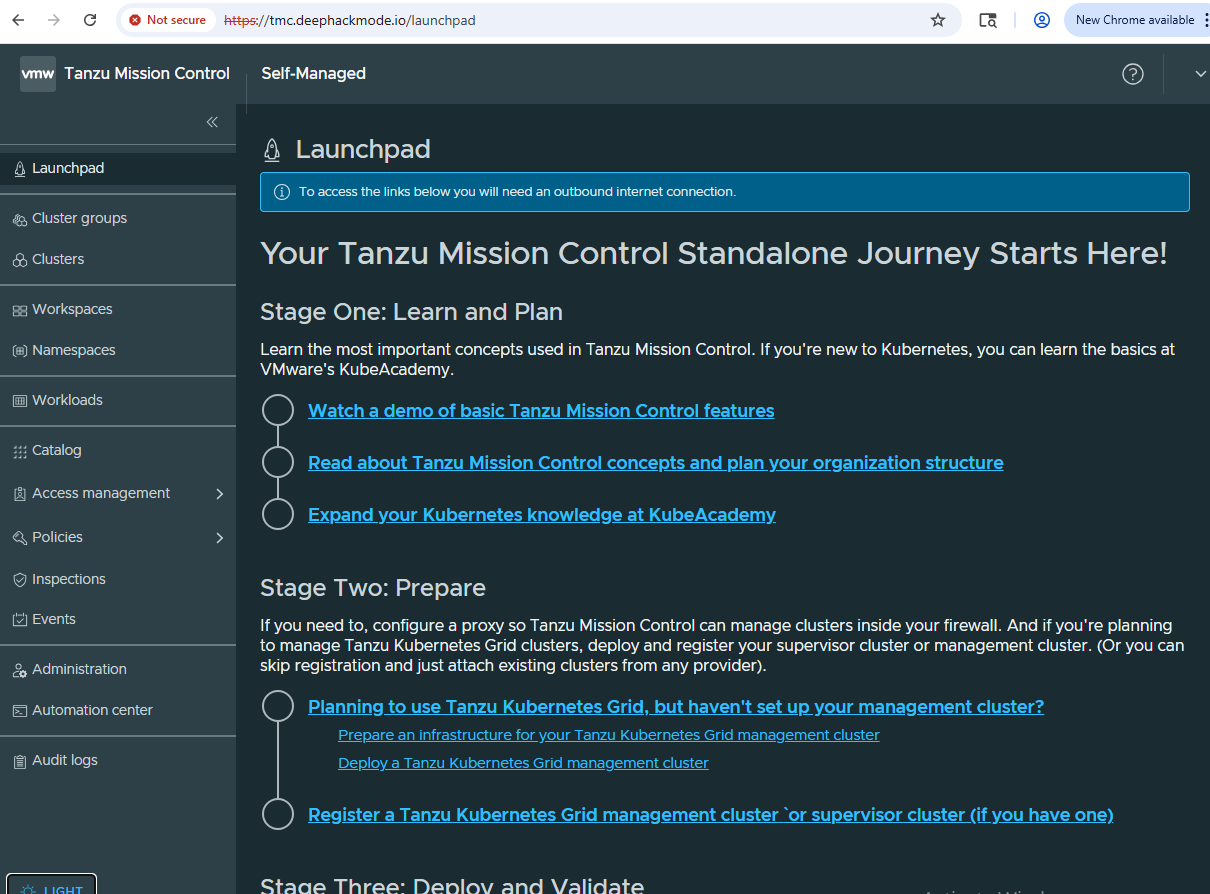
The Clusters page would be empty for now, obviously.
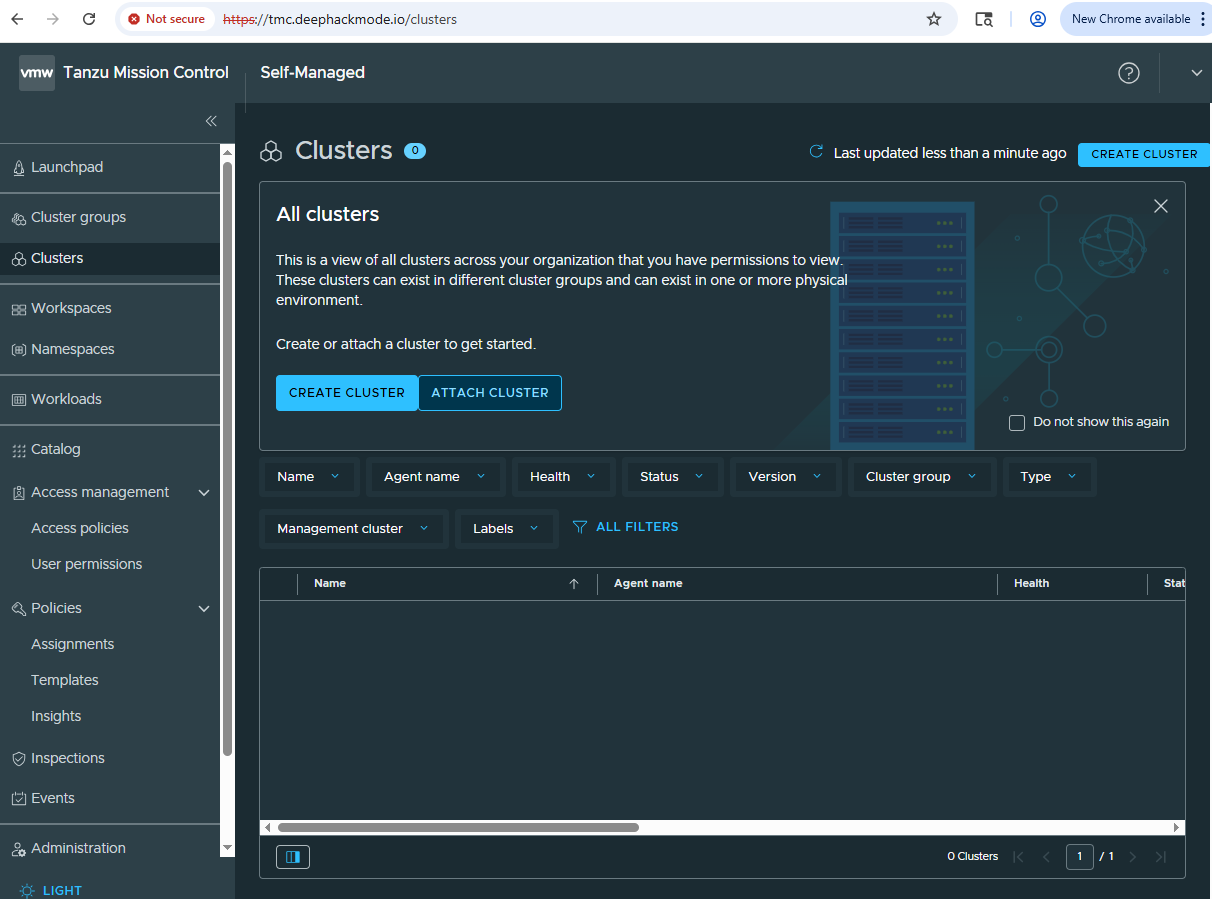
Let’s attach my TKGI cluster.
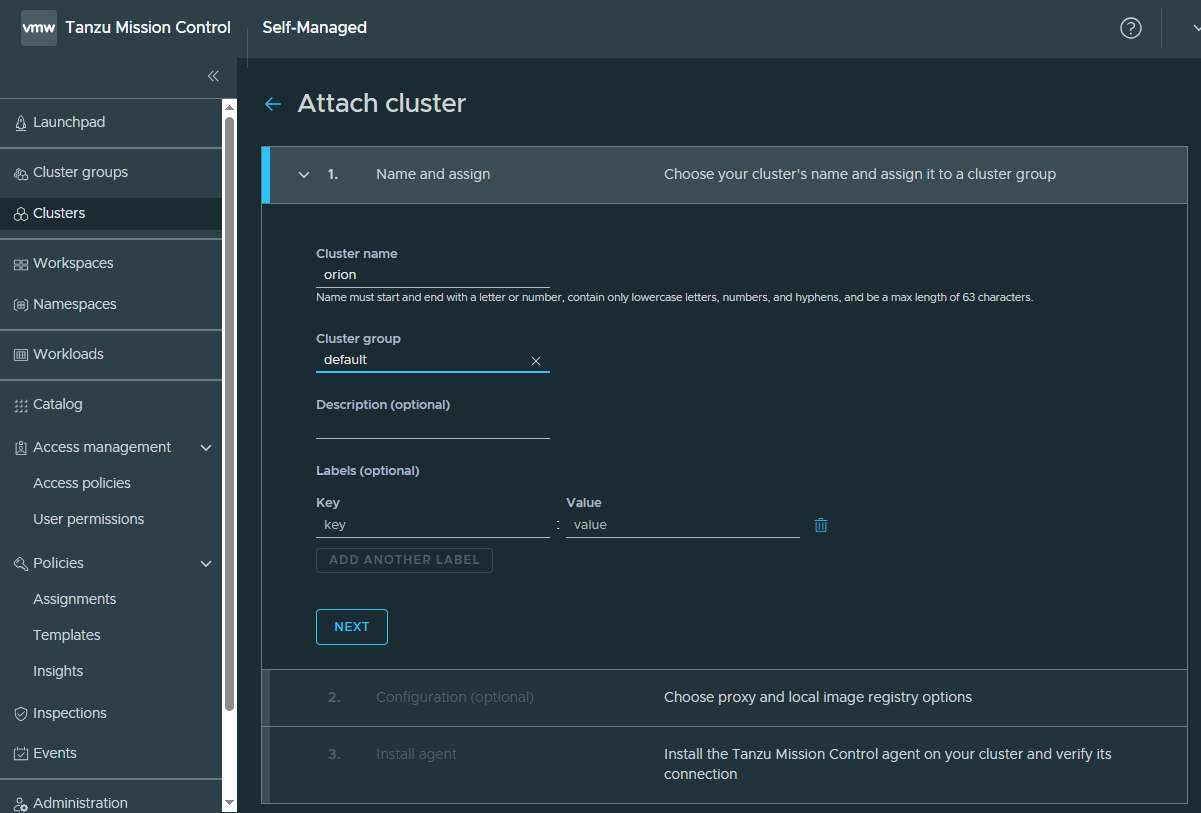
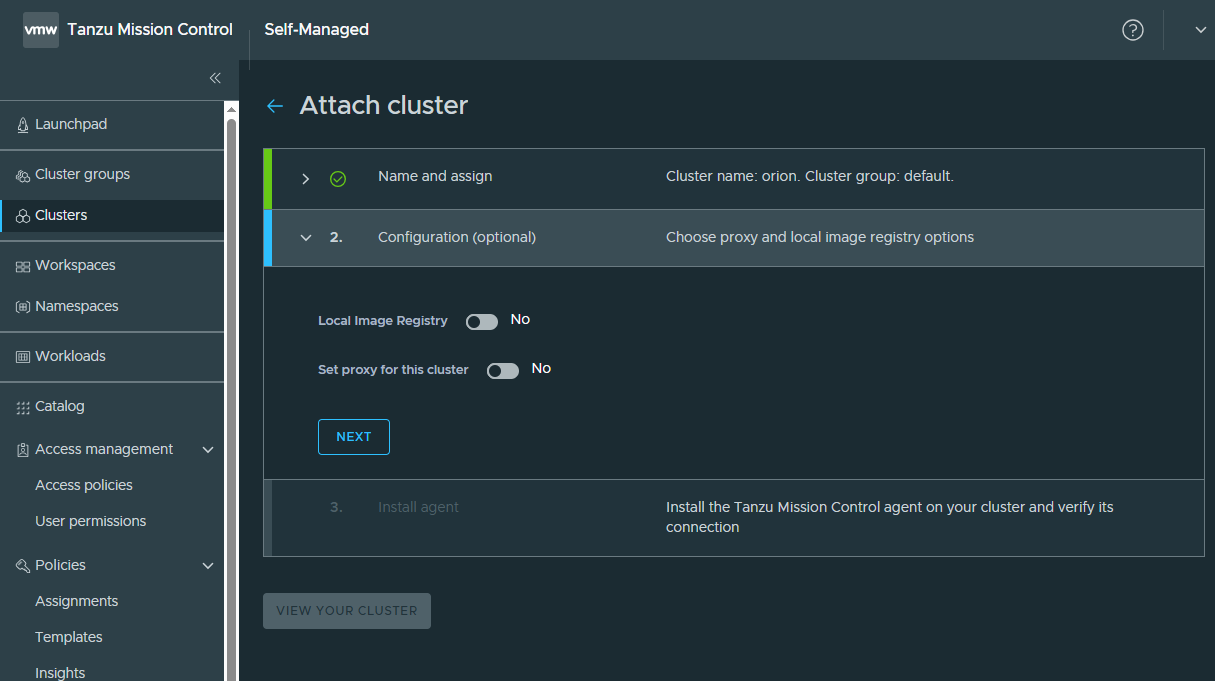
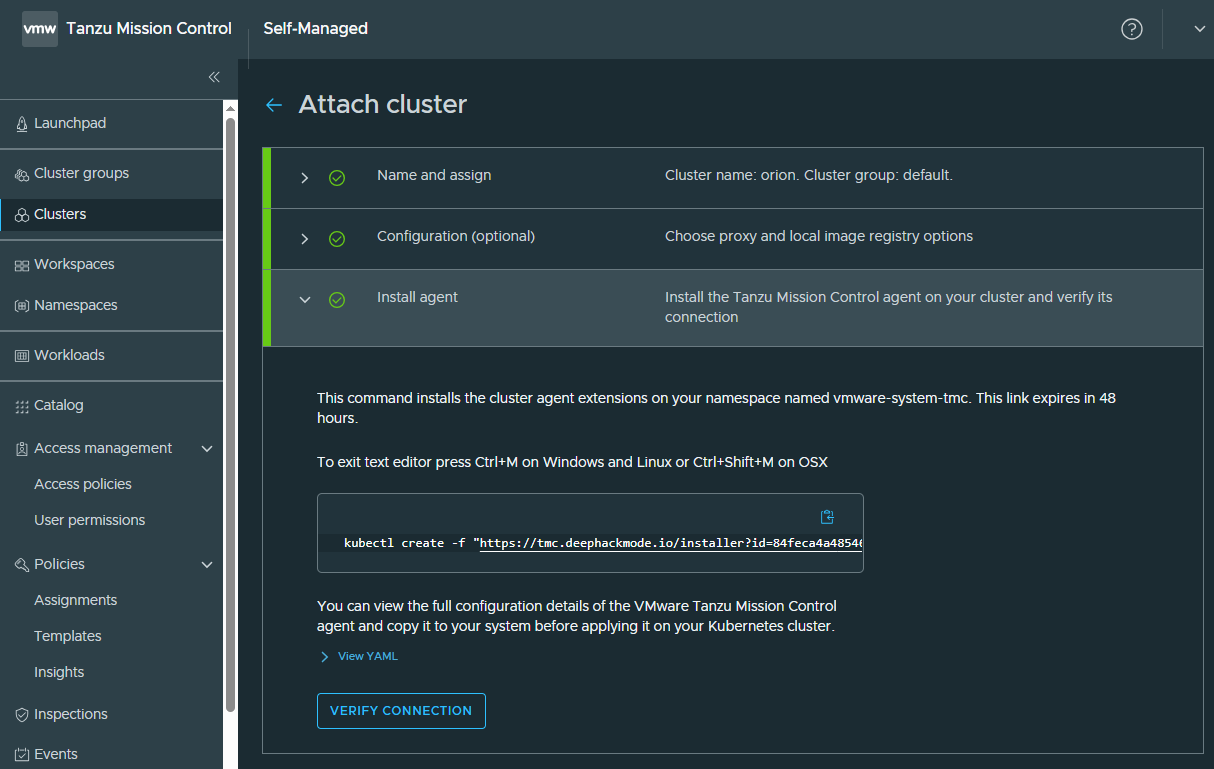
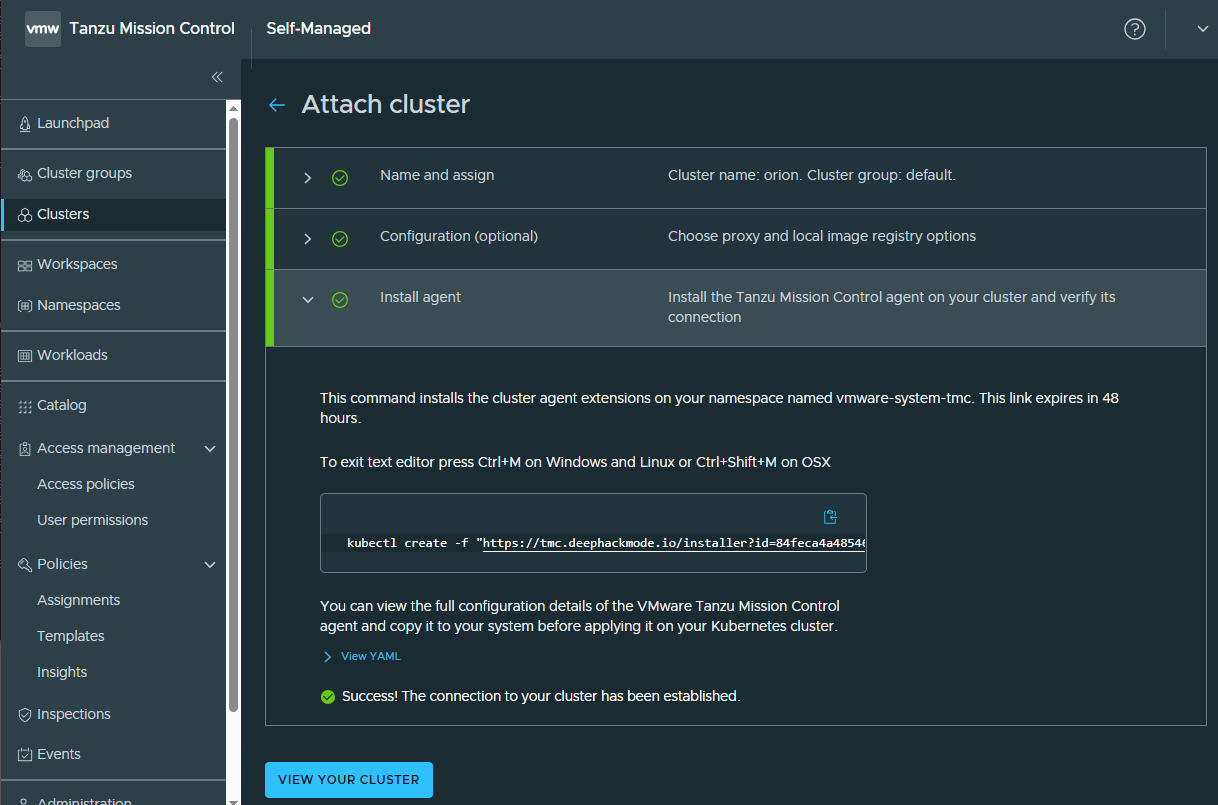
My TKGI cluster has been attached successfully! I could see our Openldap workload app there as well.
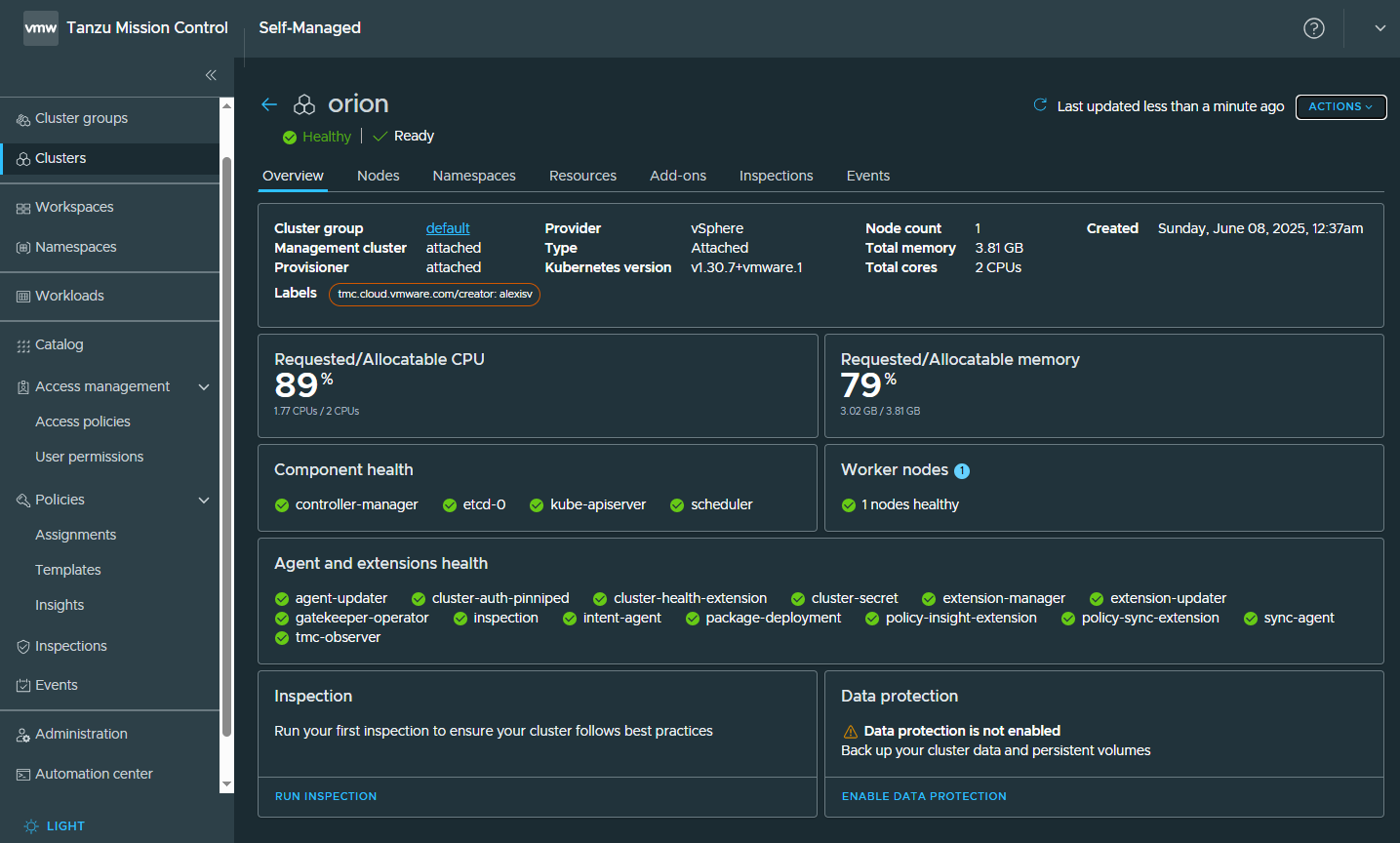
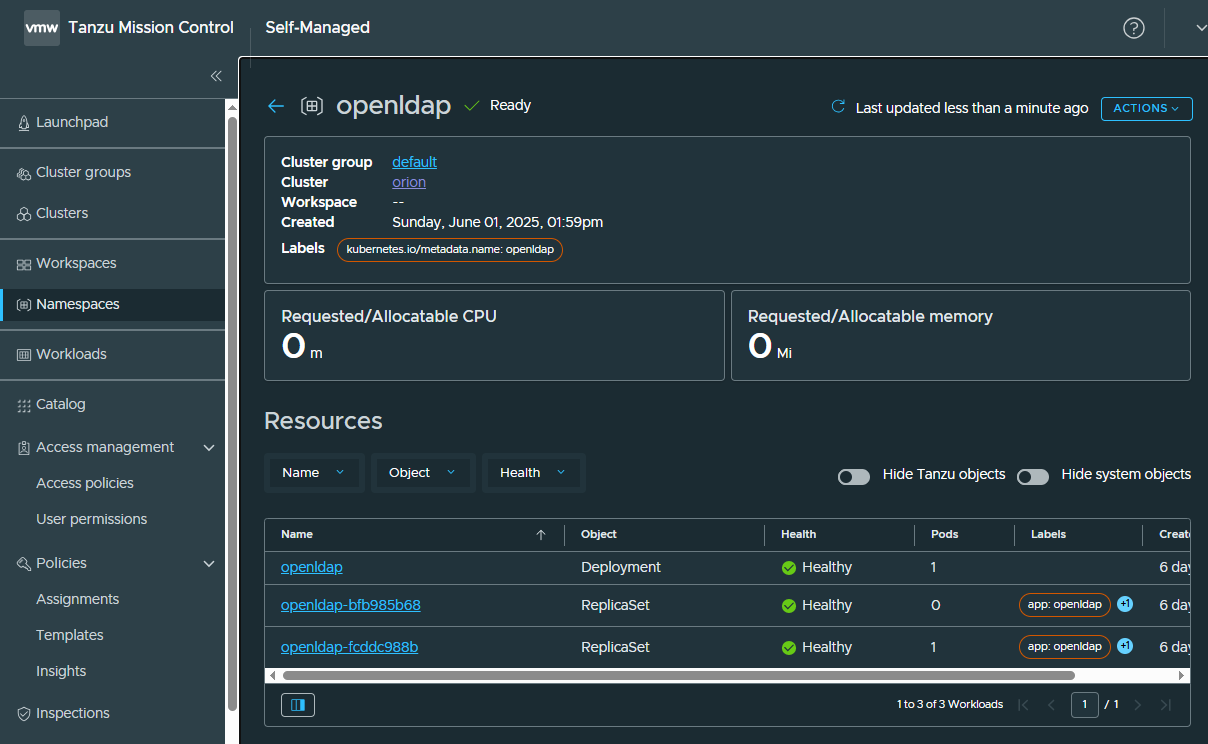
That concludes my task to install the VMware Tanzu Mission Control Self-Managed!